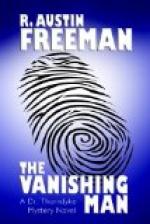“It is the lower half of a trunk which the police dredged out of a rather deep pond on the skirts of the forest at Loughton—Staple’s Pond, it is called. The bones found were the pelvis—that is, the two hipbones—and six vertebrae, or joints of the backbone. Having discovered these, the police dammed the stream and pumped the pond dry, but no other bones were found; which is rather odd, as there should have been a pair of ribs belonging to the upper vertebra—the twelfth dorsal vertebra. It suggests some curious questions as to the method of dismemberment; but I mustn’t go into unpleasant details. The point is that the cavity of the right hip-joint showed a patch of eburnation corresponding to that on the head of the right thigh-bone that was found at St. Mary Cray. So there can be very little doubt that these bones are all part of the same body.”
“I see,” grunted Mr. Bellingham; and he added, after a moment’s thought: “Now, the question is, Are these bones the remains of my brother John? What do you say, Doctor Thorndyke?”
“I say that the question cannot be answered on the facts at present known to us. It can only be said that they may be, and that some of the circumstances suggest that they are. But we can only wait for further discoveries. At any moment the police may light upon some portion of the skeleton which will settle the question definitely one way or the other.”
“I suppose,” said Mr. Bellingham, “I can’t be of any service to you in the matter of identification?”
“Indeed you can,” said Thorndyke, “and I was going to ask you to assist me. What I want you to do is this: Write down a full description of your brother, including every detail known to you, together with an account of every illness or injury from which you know him to have suffered; and also the names and, if possible, the addresses of any doctors, surgeons, or dentists who may have attended him at any time. The dentists are particularly important, as their information would be invaluable if the skull belonging to these bones should be discovered.”
Mr. Bellingham shuddered.
“It’s a shocking idea,” he said; “but, of course, you are quite right. You must have the facts if you are to form an opinion. I will write out what you want and send it to you without delay. And now, for God’s sake, let us throw off this nightmare, for a little while, at least! What is there, Ruth, among Doctor Barnard’s music that you can manage?”
Barnard’s collection in general inclined to the severely classical, but we disinterred from the heap a few lighter works of an old-fashioned kind, including a volume of Mendelssohn’s Lieder ohne Worte, and with one of these Miss Bellingham made trial of her skill, playing it with excellent taste and quite adequate execution. That, at least, was her father’s verdict; for, as to me, I found it the perfection of happiness merely to sit and look at her—a state of mind that would have been in no wise disturbed even by Silvery Waves or The Maiden’s Prayer.




